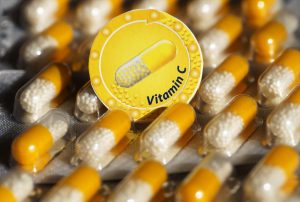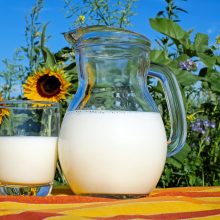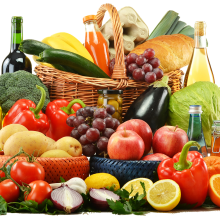This Doctor Explains Why Taking Vitamins Is Critical to Maintaining Your Health
By Joseph Lilli and Dr. David Blyweiss, M.D.
If you’re like many seniors these days, you may be worried about getting COVID19 or some other deadly disease or illness? After all, as seniors we’re all more vulnerable to pathogens, viruses, and the like than younger folks.
But I’m not overly worried. And with good reason.
You see, I take certain high-quality vitamins and other nutritional supplements that have been scientifically proven to bolster my immune system.

But as you probably know, many doctors today downplay the importance of taking vitamins and nutritional supplements. In fact, they falsely claim most people can get all the necessary vitamins and minerals they need by eating a healthy diet of fruits, vegetables, and other nutrient-dense foods.
They make that claim because they received little instruction on nutrition and the importance of vitamin supplementation while in med school.
Below is an article by Dr. David Blyweiss, M.D. Unlike many conventional doctors, Dr. Blyweiss believes in the importance of taking vitamins . . . and even lists some of the ones he’s taking to stay in good health.
Dr. Blyweiss writes . . .
“In my experience, there are people in two camps of thinking. Those who take their vitamins… and those who don’t.
People who scoff at the idea of supplementing think it’s a way to create expensive urine. After all, anything not used by your body just gets processed by your liver and kidneys — then expelled from the body.
These folks would be shocked by the number of supplement bottles lining my bathroom countertop.
I always respond to folks like this…
Sure, that vitamin supplement costs some money. But paying for a few bottles is nothing compared to a $300 per month medicine bill. That’s what you’d have if you became ill due to a vitamin deficiency.
People don’t always understand this.
Really, when look at our nation’s population, 79% of adults over the age of 55 are taking some sort of dietary supplement.[1]
Even Dr. Anthony Fauci, the 79-year-old director of the National Institute of Allergy and Infectious Diseases pops his supplements every day. Recently, he told the press how he takes vitamin D to help keep his immune system strong.[2]
It’s a smart move. Researchers found a link between vitamin D deficiency and the likelihood of being infected with COVID-19 and other respiratory infections.[3]
Now personally, I take my vitamins and other supplements every single day. And you should too.
And it’s not just vitamin D either. I need to give my body other nutrients that it would otherwise be lacking. Eating healthy isn’t enough. You see, our national food supply isn’t what it used to be. And there are many factors at play that may be jeopardizing your health.
Popeye’s Spinach Isn’t What It Used to Be
One of the biggest arguments I hear against taking supplements has to do with eating a healthy diet. People would rather get the nutrients they need from real food.
And I applaud that line of thinking!
But let’s be realistic for a second. How many folks out there are really and truly eating a healthy diet? How many eat only organic, non-GMO vegetables and fruits, nuts, seeds, berries, and grass-fed meats?
Not many people…
And even if you ARE one of those people, you need to realize that our national food supply isn’t what it used to be. Fifty years ago, a can of spinach had something like 200 grams of iron.
So, it made sense that Popeye would chug it down in those cartoons.
Today, that same can of spinach has only a fraction of the nutrients that it did years ago. This is because our modern farming practices have weakened our soils. Plants no longer take up the same values of vitamins and minerals they used to.
A landmark study done by a team at the University of Texas (UT) found that 43 different vegetables and fruits have less nutritional value than they did 50 years ago.
The amounts of protein, calcium, phosphorus, iron, vitamin B3, and vitamin C were all lower. This is blamed mostly on modern farming practices that deplete our soils of nutrients. The focus on bigger and faster growing crops also plays a role.[4] This is where the next evolution of food health has to take place: soil rehabilitation to healthy plant foods to healthier humans.
Then, think about calcium. Your first thought might be that you get this from drinking milk. But where does the cow get the calcium it needs to put into the baby calf’s milk? From the ground!
Conventionally raised food is missing so many of the critical nutrients that you need. Simple blood tests can tell us what we’re lacking. Then it’s up to you, to help your body work better by taking targeted balanced nutrients.
You Can’t Always Trust Your Doc’s Advice
Your next argument against supplementation might have to do with the advice you hear from your doctor.
“He never said I needed to take anything, so I’m not going to bother.”
Sadly, a large number of practicing doctors have had very little to no education on nutrition. Surveys have found that many medical schools don’t provide the required 25 hours of nutrition education.[5]
Then, 62.6% of graduates from US medical schools say they wished they had received more training.[6]
So, most doctors don’t understand about the critical role your diet can play on your health and resistance to disease.
My best suggestion is to go get tested – don’t guess. There are tests out there that will tell you what critical nutrients, minerals, trace elements and vitamins you’re lacking.
Personally, I’m eating a diet focused on organic, non-GMO vegetables and fruits, nuts, seeds, berries, and grass-fed meats. Then, I supplement my body with several important vitamins and minerals to keep my body strong and operating as it should.
My List of Essential Supplements to Take
Vitamin C – Dogs can go lie in the corner when they are not feeling well and their body will actually generate its own vitamin C. [7] We humans, on the other hand, need to get our vitamin C from outside sources. It’s one of the vitamins that can have a helpful effect on your body’s ability to fight off viral diseases like COVID-19.
Vitamin D – Vitamin D is important to the function of the immune system. Take this along with vitamin K2 which helps direct calcium into your bones.
Fish oil – Fish oil supplements have an effect of decreasing inflammation and increasing blood flow. In fact, the American Heart Association recommends 1 g of long-chain omega-3 fatty acids from fish oil per day for those with heart disease.[8]
B-vitamins – Personally, I do manage to get most of my B vitamins from food. But if your diet isn’t up to snuff, you may need to supplement. Vitamin B12 is especially important to add if you’ve had gastric bypass surgery or are a strict vegan.
Digestive enzymes – I began to add these to my mealtimes several years ago. After a certain age, your body doesn’t make the gastric acids it used to… to help digest your foods. You’ll be able to naturally extract more nutrition from your foods if you add enzymes to your mealtimes.
Alpha-lipoic acid and N-acetylcysteine – Take this to generate glutathione for your liver as a major detoxifier.
Nitric oxide enhancer – An NO enhancer is important to help smooth the endothelial lining of your arteries.
Curcumin – This is naturally found in the spice turmeric and is also present in curry. It is a natural anti-inflammatory and helps keep your brain sharp. I suggest taking 2 capsules of 500 mg per day.
My recommendation if you’re able to, is find an Institute for Functional Medicine certified clinical nutritionist and discuss the testing, supplementation and lifestyle program they offer to see if it will work in your life. Remember, the cost for these supplements is only a fraction of the other option… medical bills for being sick!”
Sources:
[1] CRN Consumer Survey on Dietary Supplements. Press release. Sept 30, 2019. Available Online: https://www.crnusa.org/newsroom/dietary-supplement-use-reaches-all-time-high
[2] CNBC.com. The supplement Dr. Fauci takes to help keep his immune system healthy. Jade Scipioni. Sept 14, 2020. Available Online: https://www.cnbc.com/2020/09/14/supplements-white-house-advisor-fauci-takes-every-day-to-help-keep-his-immune-system-healthy.html
[3] UChicago News. Vitamin D deficiency may raise risk of getting COVID-19, study finds. Gretchen Rubin. Sept 8, 2020. Available Online: https://news.uchicago.edu/story/vitamin-d-deficiency-may-raise-risk-getting-covid-19-study-finds
[4] Scientific American. “Dirt Poor: Have Fruits and Vegetables Become Less Nutritious?” April 27, 2011. Available Online: https://www.scientificamerican.com/article/soil-depletion-and-nutrition-loss/
[5] Committee on Nutrition in Medical Education, Food and Nutrition Board, Council on Life Sciences, National Research Council. Nutrition education in U.S. medical schools. Washington, DC: National Academy Press, 1985.
[6] Association of American Medical Colleges. Medical school graduation questionnaire. Tucson, Z: University of Arizona, 1995.
[7] Guy Drouin, Jean-Rémi Godin, and Benoît Pagé. “The Genetics of Vitamin C Loss in Vertebrates.” Curr Genomics 12(5): 371–378. (2011) doi: 10.2174/138920211796429736
[8] Harris, William S. “Fish oil supplementation: evidence for health benefits.” Cleveland Clinic journal of medicine 71.3 (2004): 208-221.
This article by Dr. Blyweiss appears courtesy of Advanced Natural Wellness, the natural health newsletter that lets you in on the newest discoveries and latest breakthroughs in natural medicine.




